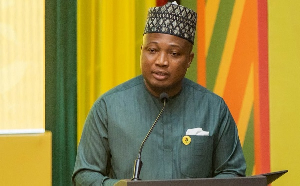The Sub Metro Director of Okaikoi South, Mr. Nathaniel Adzotor, has disclosed that, about one-third of residents in Accra live in slums and as a result do not enjoy adequate social services.
Mr. Adzotor explained in a statement he made at an inaugural ceremony of the Community Water and Sanitation Boards (WSB) for WATER Access, Sanitation and Hygiene (WASH-UP) programme in Accra this week, that, due to the poor layout and informal nature of these settlements service providers find it difficult to capture the dynamics of their population data and to map them properly for social services delivery.
He mentioned that most of these residents have limited access to water and little or no access to toilets, as a result of which households spend significant amount of time and money to access unsanitary toilet facilities and obtain water at exorbitant prices.
In response to these challenges posed by slums in Accra, the sub metro Director further disclosed that, the Accra Metropolitan Assembly (AMA) has directed all house owners in the metropolis to provide toilet facilities in their houses by the close of 2010. The directive, he said, forms part of the implementation of the Urban Environmental and Sanitation Program l and ll (UESP) and the Urban Poverty Reduction Project initiated by the Central Government in collaboration with the AMA and the World Bank.
He said: "...to compliment current efforts, and as part of its interventions in slum upgrading, CHF was initiating The Ghana Water Access, Sanitation and Hygiene for the Urban Poor (WASH-UP) programme, funded by the USAID under the African Poor -Improved Water Supply and Sanitation with the overall goal of improving conditions in urban slums with very poor access to water and sanitation service, due to interlinked infrastructural, managerial, economic and behavioral constrains which results in high incidence of associated disease.
He added that, it is the intention of the Co-operative Housing Foundation (CHF), a not-for-profit organization, working on issues of housing, water and sanitation, to accomplish this goal through a community -driven approach involving a broad range of stakeholders in Ghana to address critical gaps in availability and access to water and sanitation services for the urban poor.
" The programme will be implemented in three slum communities of Accra, namely, Avenor, Nima and Accra New Town; and two slum communities in Takoradi: New Takoradi and Kojokrom, where water, sanitation ,hygiene, and related health problems are particularly severe" he stressed.
He intimated that, the project proposes to increase access to affordable, improved, and sustainable drinking water supply, increase household access to improved and sustainable sanitation facilities, promote innovative economic enterprises in the areas of water and sanitation, improve hygiene and sanitation behaviours among the urban poor and finally strengthen local governance for water supply, sanitation service and hygiene.
Mr. Adzotor made it known that; AMA is preparing its Medium Term Development Plan (MTDP) and urged all residents of the metropolis to provide inputs into the plan. The plan, he indicated, will in part, focus on initiatives to provide reliable and affordable drinking water and sanitation services to residents.
Also present at the ceremony, were members of the Community Water and Sanitation Board, who pledged to carry out their responsibility as members of the Board with diligence, and to uphold the interest of their communities without fear or favour.
Meanwhile, Dr. Nii Moi Thompson, an economist, has equally expressed grave concern about the non-compliance with town and country planning regulations leading to pockets of slums even in residential areas. He cautioned in an interview with JOY FM this week that if not checked the situation will within the next 15 -20 years degenerate culminating in an upsurge in slums nationwide
General News of Friday, 30 April 2010
Source: Public Agenda












